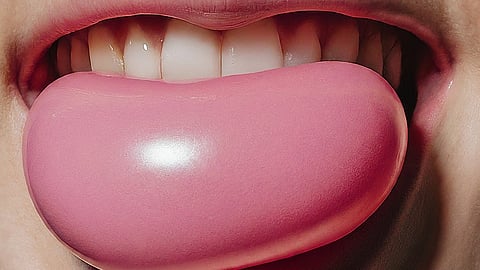

(AP)
A buzz in the current generation is to get a more defining jawline. Different products and techniques have claimed to give a better jawline and chewing gum is one of them. However, there is no scientific evidence to support the claim that chewing gum gives a better jawline.
Chewing gum might strengthen the jaw muscles but does not give a chiseled look. Our jawline is determined by genetics. Also, sometimes its appearance changes due to fat deposits around the chin when you gain weight. So, chewing gum doesn't help to reduce the fat as it doesn’t burn calories.
Chewing gum doesn’t improve the jawline because there are no muscles in the jaw, and the muscles involved in chewing gum are those of the cheek and neck. The jawline might appear less defined due to a double chin. Due to weight gain, and imbalance between the amount of food intake and the physical activity, fat deposition occurs around the chin.
A study conducted on children in 2012 showed that when children were trained to chew gum, after a minimum of 4 weeks, their maximum bite force (MBF) function improved. According to a study in 2013, chewing gum might help to lose weight by indirectly reducing cravings and appetite.
According to a 2018 study, for individuals with dolichofacial type, masticatory performance can be increased by chewing gum exercise. Another study also found that chewing gum can aid in swallowing and feeding. Another study conducted in 2019 concluded that chewing training helped improve swallowing and feeding, but had no connection with jawline improvement.
Taking to Instagram, Dr. Diksha Batra, a dentist, shared her opinion and said that “exercise and a good diet will help to get a better jawline. Chewing gum helps to cleanse your teeth by taking out the bacteria and reducing the bacterial count in the mouth. If the pH of saliva is super acidic and causes cavities, chewing gum can also change it. Chewing gum can strengthen the jaw muscles but does not reduce the fat on the jawline. She concluded that chewing gum can be good if used in moderation.”
Risks of chewing gum:
1. Digestive issues: When chewing gum, we ingest a lot of air, which might lead to gas, bloating, cramps, and heartburn. Also, chewing gum contains a large amount of sugar, which usually draws a large amount of water into the large intestines, which can lead to digestive issues. The sugars can also cause digestive problems in people with irritable bowel syndrome.
2. Temporomandibular joint disorders: It is a condition that occurs when there is dysfunction in the temporomandibular joint, which occurs due to excessive activities like eating, talking, and constant movement. When jaw muscles are constantly contracting, it can lead to jaw clicking and popping.
3. Headaches: Another risk associated with chewing gum is headaches. Due to the constant use of facial muscles for chewing, the facial muscles can sometimes tighten and cause headaches. Also, a study conducted on 30 people showed that 19 of them had reduced headaches when they stopped chewing gum. According to a 2015 report, CNS & Neurological Disorders: Drug Targets, chewing gum daily can lead to tension headaches and migraines.
4. High sugar ingestion: according to an article, one stick of chewing gum has 2 grams of sugar, and the sugar intake increases based on how many gums are chewed that day. High sugar content is a risk to the oral cavity and might cause tooth decay, cavities, enamel erosion, and affect gums.
Benefits of Chewing Gum:
The benefits of chewing gum are keeping the breath fresh; it also helps in reducing stress, improving concentration, uplifting mood, managing sleep, and minimizing food cravings, which can reduce appetite. Also, the main benefit of chewing gum is for people with nicotine and tobacco addictions, as gum helps to overcome those addictions.
A balanced diet and weight loss:
To reduce the fat accumulation near the chin and jaw area and to lose weight, the first thing is to burn calories. For burning calories, exercise that includes physical activity is necessary and reduce calorie intake. Avoid processed and fried foods and drinks rich in sugar. Take foods that aid in weight reduction, like salmon, avocados, and cottage cheese. Take a balanced diet of fruits, vegetables, low-fat dairy products, lean proteins, and whole grains.
Methods for improving jawline:
1. Diet and exercise: following a proper diet, which can reduce facial fat, regularly doing exercises, and eating healthy can help improve jawline.
2. Botox and fillers: Botox relaxes the masseter muscles, and fillers, where injections of hyaluronic acid and collagen are given, can improve the jawline, but these are temporary, and regular and continuous treatment is required.
3. Kybella: the main active ingredient in kybella is deoxycholic acid. As already discussed, the jawline can appear not so sharp due to fat deposition, so deoxycholic acid breaks down fat, which can improve the appearance of the jawline.
4. Surgery: the permanent options to improve jawline are chin augmentation, neck lift, neck liposuction, fat grafting, facial implants, and orthognathic surgery.
(Note: This content is purely informational and isn’t medical guidance. It shouldn’t replace professional medical counsel. Always consult your physician regarding treatment risks and benefits).
REFERENCES:
1. Sugue, M. (2024, February 22). Does chewing gum help shape or strengthen your jawline? NewMouth. https://www.newmouth.com/blog/does-chewing-gum-help-jawline/
2. Barhum, L. (2024, July 1). Does chewing gum help your jawline? Verywell Health. https://www.verywellhealth.com/gum-chewing-jawline-8670499#:~:text=Some%20believe%20it%20may%20help,noticeable%20changes%20to%20your%20jawline.
3. Cronkleton, E. (2021, July 22). Why chewing gum isn’t proven to improve the appearance of your jaw. Healthline. https://www.healthline.com/health/does-chewing-gum-help-jawline#takeaway
By Dr. Siddiqua Parveen
